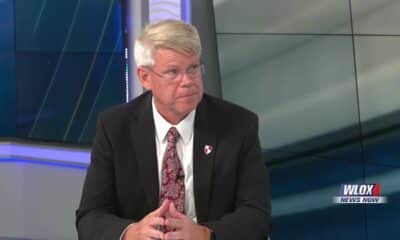Mississippi Today
Reeves again blocks funds for LeFleur’s Bluff project in Jackson
For the third consecutive year legislative efforts to direct state money to renovate LeFleur’s Bluff in Jackson have been stymied, thanks in large part to Gov. Tate Reeves.
Earlier this week, the Republican governor vetoed a portion of a bill that directed $14 million to the office of Secretary of State Michael Watson for work on developing and improving a nature trail connecting parks and museums and making other tourism-related improvements in the LeFleur’s Bluff area.
It is not clear whether the Legislature could take up the veto during the 2025 session, which begins in January, though, that’s not likely. The Legislature had the option to return to Jackson Tuesday to take up any veto, but chose not to do so.
Of the project, Watson said, “Our office was approached late in the session about helping with a project to revitalize LeFleur’s Bluff. As Mississippi’s state land commissioner, I was more than happy to help lead this effort not just because it’s a natural fit for our office, but also because I believe Mississippi needs a thriving capital city to retain our best and brightest. Investing state funds in state property on a project to enhance the quality of life in Jackson makes good sense.
“Unfortunately, some only support it when it equates to campaign contributions. Sadly, through the line-item veto of the appropriation, Mississippians will once again wait another year for the opportunity to benefit from state investments for the greater public good.”
Various groups, such as representatives of the Mississippi Children‘s Museum and many other community leaders have been working on the project for years. The area already is the home of the Children’s Museum, Museum of Natural History, Mississippi Sports Hall of Fame and Museum and a state park.
The issues with LeFleur’s Bluff first arose in 2022 when Reeves vetoed a $14 million appropriation that in part was designed to redesign and create a new golf course in the area. Previously, there had been a nine-hole, state-owned golf course operated by the Department of Wildlife, Fisheries and Parks at LeFleur’s Bluff State Park.
In 2022, the LeFleur’s Bluff project was one of literally hundreds of projects funded by the Legislature – many of which was tourism projects like LeFleur’s Bluff. The governor only vetoed a handful of those projects.
When issuing the LeFleur’s Bluff veto, Reeves said the state should not be involved in funding golf courses.
Then last year $13 million was directed to the Department of Wildlife, Fisheries and Parks to spend on the LeFleur’s Bluff project. But legislative leaders said state money would not go toward a golf course.
Lawmakers opted to transfer the project to the Secretary of State’s office late in the 2024 session, apparently in part because they felt the Department of Wildlife, Fisheries and Parks had not made enough of an effort to begin the project.
Lynn Posey, executive director of Wildlife, Fisheries and Parks, said that before moving forward with the project, “We felt like we needed to do engineering work and see what the situation was. We never got a chance to move forward” because the Legislature redirected the money.
Posey said an engineer’s report was needed because “it is a unique piece of land.” He said much of the land is prone to flooding.
He said before that work could begin the Legislature switched the authority to the Secretary of State’s office. Posey was appointed to his current position by Reeves, whose office had no comment on the veto.
Lt. Gov. Delbert Hosemann said after the governor’s veto, “Projects like the LeFleur’s Bluff development are critical to the Capital City, the wider metropolitan area, and our state. Public parks add to the quality of life for our citizens. I am hopeful the individuals involved in this project, including those at the Mississippi Children’s Museum, will continue their work to improve this state asset.”
While the Constitution instructs the governor to provide to the Legislature a reason for any veto, Reeves did not do so this year when vetoing the money going to the Secretary of State’s office.
On Monday, the governor also vetoed a portion of another bill dealing with appropriations for specific projects. But in this case, the veto was more of a technicality. The bill was making corrections to language passed in previous sessions. In that language were five projects the governor vetoed in 2022.
The language, as it was written, would not have revived those previously vetoed projects, the governor said. But Reeves said he vetoed the five projects out of caution. He did the same in 2023 when those five projects, which included money appropriated in 2022 for the Russell C. Davis Planetarium in Jackson, were carried forward in a bill also making corrections to previously passed legislation.
This article first appeared on Mississippi Today and is republished here under a Creative Commons license.
Mississippi Today
On this day in 1954
Sept. 7, 1954

In compliance with the recent Brown v. Board of Education decision, schools in Baltimore and Washington, D.C., were desegregated. Baltimore was one of the first school systems to desegregate below the Mason-Dixon line.
A month after a dozen Black students began attending what had been an all-white school, demonstrations took place, one of them turning violent when 800 whites attacked four Black students. White parents began pulling their children out of the schools, and by 1960, the district was majority Black.
This article first appeared on Mississippi Today and is republished here under a Creative Commons license.
Mississippi Today
USM admin say program cuts are necessary to afford future pay raises for faculty, staff
The University of Southern Mississippi will look at cutting under-enrolled programs even though administrators say it is not facing a financial crisis.
The budget is balanced, despite a four-year period of decreasing revenue and increasing costs, and USM has adequate cash reserves.
The move is necessary, top leaders said at last month’s convocation, so the research institution in Hattiesburg can survive the increasingly competitive future facing higher education in Mississippi by becoming a “unicorn” among its peers, offering programs students want and the state needs.
“Colleagues, this is plain and simply the reality of where we are in higher education today, and progressive institutions all across the landscape are doing the same,” President Joe Paul told faculty on Aug. 19, according to a video the university has since taken off YouTube after faculty and staff had a chance to watch it. “We can no longer simply kick the can down the road and hope things can get better. We will instead take charge of our future and crease a uniquely positioned, distinctive public research universty of which we can all be proud and feel ownership.”
Paul added that cuts are also one of the few ways the university can afford more pay raises for its faculty and staff, some of whom will receive merit raises this fall for the first time in eight years. (After protesting, minimum wage workers at USM won a pay raise two years ago.)
“My goal for us is not to go another eight years before offering raises again, that accomplishes little,” Paul said. “If we are to develop a true salary increase plan that is competitive and sustainable, we simply must continue to do two things with discipline and consistency. One, we must all continue to grow the enrollment through recruitment and retention … while also continuing to find efficiencies and decrease spending as an institution.”
USM was able to afford the raises, which total about $4.4 million, through what Paul described as two years of systematic reductions in administrative spending. The university cut 22 unfilled and six filled positions at its Hattiesburg and Gulf Park campuses.
An increase in state appropriations also helped support the raise, but USM isn’t able to say how much because “the raises come from the university’s operating budget and the amount is not broken down by revenue source,” Nicole Ruhnke, a spokesperson, wrote in an email.
The raises addressed a significant concern for faculty at USM who held a protest for fair pay earlier this year.
Low salaries are an issue across Mississippi’s higher education system, which has struggled to attract and retain talented faculty. In recent years, the governing board of Mississippi’s eight universities has repeatedly heard how Mississippi’s faculty and staff are paid well below the average salary of other Southern states.
In an effort to fix that, the Institutions of Higher Learning Board of Trustees asked the Legislature to provide $53 million in funding this year so that each university could afford a 6.4% raise.
IHL’s spokesperson John Sewell wrote in an email that the system ultimately received $27 million in unrestricted new funding, not enough for 6.4% increase.
That funding also needed to cover other inflationary costs facing the institutions, like PERS and health insurance, Sewell wrote.
Therefore, IHL left the final decision on raises up to the institutions, so Sewell could not say how much each university spent. Plus, the system’s final appropriation bill, which IHL negotiates on behalf of the eight institutions, did not include specific language regarding raises.
“IHL did not prescribe a fixed amount of new funding to be dedicated to raises as the individual institutions needed the flexibility to balance the increased costs for PERS and health insurance along with other inflationary costs before considering the amount for possible raises,” Sewell wrote.
Those costs are also driving USM administrators’ review of under-enrolled programs, which comprise a minority of USM’s programs.
Lance Nail, the provost, is leading that effort. In response to questions from Mississippi Today, Nail and Paul did not participate in an interview but provided statements.
Nail wrote that details about the program review will be worked out in the coming weeks in consultation with faculty, staff and administration.
“We will look at each under-enrolled academic program individually in collaboration with the deans, school directors and faculty, and determine what has led to low enrollment, student and market demand, as well as other contributions the program provides within the academy.” Nail noted. “These include the program’s contributions to the general education core, pre-major requirements, research and service.”
Last fall, USM deleted three degrees after IHL’s academic productivity review, which is triggered when a program is deemed to have too few graduates in a three-year period. Those degrees were a bachelors in international studies, and doctoral degrees in music education and criminal justice.
This article first appeared on Mississippi Today and is republished here under a Creative Commons license.
Mississippi Today
Richard Lake joins Mississippi Today as audience engagement specialist
Mississippi Today is pleased to announce that Richard Lake has joined the Mississippi Today team as Audience Engagement Specialist.
In this role, Lake will work directly with journalists, editors and readers to ensure Mississippi Today’s Pulitzer Prize-winning journalism reaches every corner of the state and beyond.
“Richard has developed into a respected member of the journalism community here in Mississippi,” said managing editor Michael Guidry. “He brings such an invaluable variety of skills to our newsroom that will help us further enhance how we engage with our members and growing audience.”
Born in San Antonio, Texas, Lake graduated from Mississippi State University in 2022, earning a bachelor’s degree in journalism and a minor in political science. Richard comes to Mississippi Today after over two years as WJTV Channel 12 News‘ Senior Political Correspondent. A former Mississippi Today intern, Lake previously worked on the audience team. He also completed an internship with MSNBC’s Andrea Mitchell Reports, working as a production assistant.
While at WJTV, Lake was named a finalist for TV Rookie of the Year at the 2023 Mississippi Association of Broadcasters Awards. Lake was also a part of WJTV’s award winning reporting on Mississippi’s 2023 gubernatorial election.
“Finding creative ways to provide our audience with the journalism they expect and deserve is more important now than ever,” said Lake. “I’m excited to apply innovative strategies and work alongside this incredible team in furthering the impact of our reporting.”
This article first appeared on Mississippi Today and is republished here under a Creative Commons license.
-
News from the South - Tennessee News Feed7 days ago
Teen dead after being shot multiple times in Hermitage
-
News from the South - Alabama News Feed6 days ago
Three Atlantic disturbances remain active as the peak of Hurricane Season approaches. Tropical de…
-
Local News Video5 days ago
William Carey University enrollment continuing to increase
-
Mississippi Today2 days ago
On this day in 1955
-
Mississippi Today4 days ago
Some imprisoned in Mississippi remain jailed long after parole eligibility
-
Mississippi Today4 days ago
Mississippi regulators to solar boosters: Sit down and be quiet
-
Mississippi News4 days ago
Federal money heads to Webster County to build new jail
-
Mississippi Today6 days ago
On this day in 1975








































